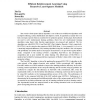Free Online Productivity Tools
i2Speak
i2Symbol
i2OCR
iTex2Img
iWeb2Print
iWeb2Shot
i2Type
iPdf2Split
iPdf2Merge
i2Bopomofo
i2Arabic
i2Style
i2Image
i2PDF
iLatex2Rtf
Sci2ools
143
Voted
JAIR
2002
2002
Efficient Reinforcement Learning Using Recursive Least-Squares Methods
The recursive least-squares (RLS) algorithm is one of the most well-known algorithms used in adaptive filtering, system identification and adaptive control. Its popularity is mainly due to its fast convergence speed, which is considered to be optimal in practice. In this paper, RLS methods are used to solve reinforcement learning problems, where two new reinforcement learning algorithms using linear value function approximators are proposed and analyzed. The two algorithms are called RLS-TD( ) and Fast-AHC (Fast Adaptive Heuristic Critic), respectively. RLS-TD( ) can be viewed as the extension of RLS-TD(0) from =0 to general 0 1, so it is a multi-step temporal-difference (TD) learning algorithm using RLS methods. The convergence with probability one and the limit of convergence of RLS-TD( ) are proved for ergodic Markov chains. Compared to the existing LS-TD( ) algorithm, RLS-TD( ) has advantages in computation and is more suitable for online learning. The effectiveness of RLS-...
Related Content
| Added | 22 Dec 2010 |
| Updated | 22 Dec 2010 |
| Type | Journal |
| Year | 2002 |
| Where | JAIR |
| Authors | Xin Xu, Hangen He, Dewen Hu |
Comments (0)

